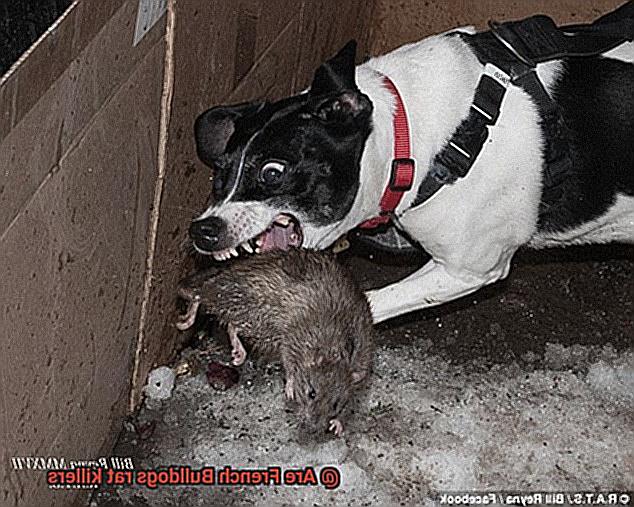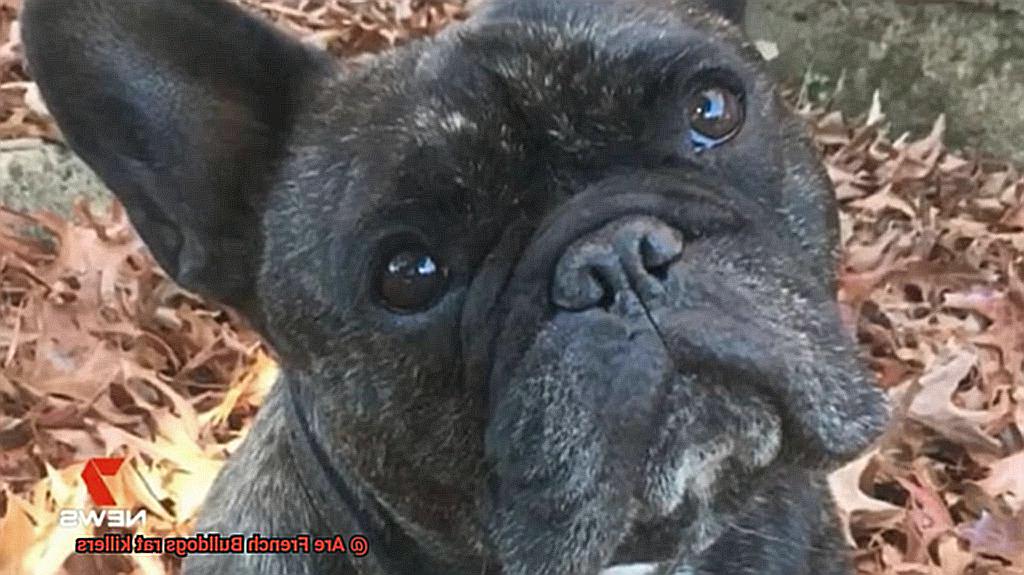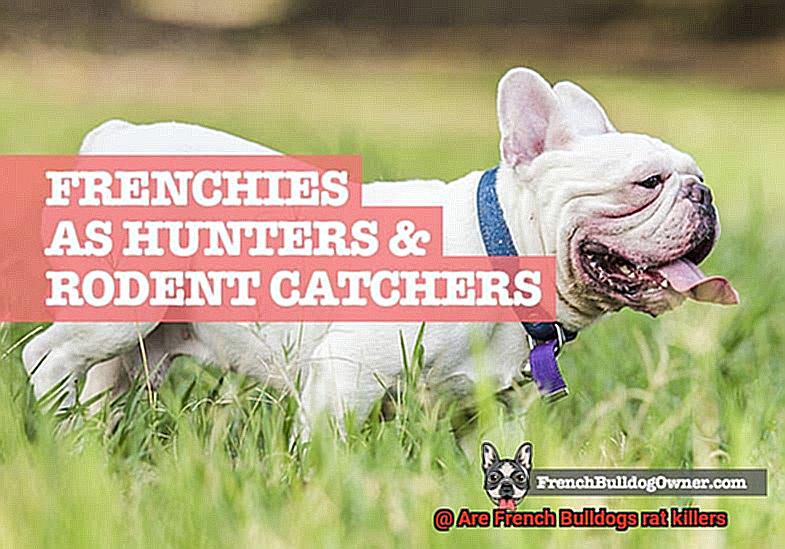Are French Bulldogs rat killers?
French Bulldogs have taken the world by storm with their infectious personalities and irresistibly squishy faces.
But amidst the love and adoration, there’s a persistent rumor that begs to be addressed: can these pint-sized pooches actually hunt down and eliminate rats? It may seem unlikely, given their small stature and friendly demeanor, but today we’re diving deep into this controversy to uncover the truth.
So get ready to challenge your assumptions as we separate fact from fiction and reveal the real nature of these delightful canine companions. Let’s find out if French Bulldogs are natural-born rat killers or simply victims of an enduring myth.

The History of French Bulldogs
Contents
- 1 The History of French Bulldogs
- 2 Physical Characteristics of French Bulldogs
- 3 Prey Drive in French Bulldogs
- 4 Are French Bulldogs Suited for Hunting Rats?
- 5 Alternatives to Relying on a French Bulldog for Rat Control
- 6 Strengths of the French Bulldog Breed
- 7 Training and Socialization for Your French Bulldog
- 8 Enjoying the Company of a French Bulldog Without Expectations
- 9 Conclusion
French Bulldogs are well-known for their adorable bat-like ears, playful personalities, and loving nature. But what about their rat-killing abilities? Many people wonder if these charming little dogs are effective at keeping rats at bay. In this blog post, we will delve into the history of French Bulldogs, their characteristics, and whether or not they make good rat hunters.
Origins and History:
French Bulldogs originated in England in the 1800s as miniaturized versions of English Bulldogs. However, it was in France where they gained popularity and became known as the “Bouledogue Français.”
Parisian society fell in love with these dogs, and they became fashionable companion pets for the upper class.
French Bulldogs were crossbred with other small breeds like Terriers and Pugs to create the distinctive features we see today.
Companion Dogs, Not Rat Killers:
Contrary to their name, French Bulldogs were never bred for hunting or vermin control purposes. Their primary purpose has always been as companion animals. While they may be curious about small animals like rats, their friendly and sociable nature makes them better suited as family pets rather than rat-killing machines.
Prey Drive and Individual Differences:
It’s important to note that every dog is an individual, and some French Bulldogs may exhibit more prey drive than others. However, it is not a characteristic trait of the breed as a whole. While your Frenchie might show an interest in chasing or catching rats, it should not be expected behavior.
Tips for Keeping Your Home Rodent-Free:
If you have concerns about rats or other vermin in your home or property, it is best to consult with professional pest control services rather than relying on your French Bulldog to handle the issue. Preventive measures such as sealing entry points, storing food securely, and utilizing traps can help keep your home rodent-free.
Physical Characteristics of French Bulldogs
French Bulldogs, or “Frenchies” as they are affectionately known, are small yet mighty dogs with a distinct set of physical characteristics that make them easily recognizable. Whether you already have a French Bulldog or are considering getting one, understanding their physical traits can help you appreciate their uniqueness and care for them better.
Compact Size:
French Bulldogs are compact in size, standing at about 11 to 12 inches tall at the shoulder and weighing between 16 to 28 pounds. Their small stature makes them suitable for apartment living or homes with limited space.
Wrinkled Face:
One of the most endearing features of French Bulldogs is their wrinkled face. They have a short, wide muzzle with loose skin folds, giving them an adorable expression. However, it’s important to keep these wrinkles clean and dry to prevent skin infections.
Bat-Like Ears:
French Bulldogs have distinctive bat-like ears that stand erect on their head. These ears not only add to their charm but also serve a practical purpose by enhancing their hearing abilities.
Sturdy Build:
Despite their small size, French Bulldogs have a sturdy and muscular build. They have a deep chest, broad shoulders, and a strong bone structure that gives them a powerful presence.
Short Tail:
French Bulldogs have a relatively short tail that is often described as “screwed” or “corkscrewed.” This unique tail adds to their overall appearance and is an essential part of their breed standard.
Smooth Coat:
French Bulldogs have a smooth and fine-textured coat that is easy to maintain. They come in various colors and patterns, including brindle, fawn, white, cream, and pied. Regular grooming and brushing can help keep their coat healthy and shiny.
French Bulldogs’ physical characteristics not only make them visually appealing but also contribute to their overall charm and personality. They are known for their friendly and affectionate nature, making them excellent companions for families, singles, and seniors alike.
Prey Drive in French Bulldogs
French Bulldogs may be known for their adorable appearance and affectionate nature, but lurking beneath their cute exteriors is a natural instinct known as prey drive. In this blog post, we will delve into the world of prey drive in French Bulldogs, exploring its origins, characteristics, and most importantly, how to manage it effectively.
The Origins of Prey Drive in French Bulldogs:

- Historical background: French Bulldogs were originally bred for ratting purposes in the 19th century.
- Ratting heritage: Their breeding history suggests that the prey drive trait has been ingrained in their DNA for generations.
- Varying intensity: While French Bulldogs possess prey drive, its intensity can differ from dog to dog.
Understanding Prey Drive in French Bulldogs:
- Moderate prey drive: Unlike some hunting breeds, French Bulldogs typically exhibit a moderate prey drive.
- Chasing vs. aggression: They may show interest in chasing small animals but are generally not aggressive or relentless in their pursuit.
Managing Prey Drive in French Bulldogs:

- Early socialization: Exposing your Frenchie to various environments, people, and animals from an early age can help them develop appropriate behaviors and responses.
- Positive reinforcement training: Utilizing positive reinforcement techniques can teach your Frenchie to control their impulses and focus on desired activities.
- Redirection techniques: Redirecting your Frenchie’s attention towards toys or games can help divert their prey drive towards more suitable outlets.
Ensuring Safety:
- Leash and secure areas: Keep your Frenchie on a leash or in a secure area when outside, especially in places with high rodent populations.
- Mental and physical stimulation: Providing interactive toys and regular exercise can help redirect your Frenchie’s energy and prevent boredom-related behaviors.
Are French Bulldogs Suited for Hunting Rats?
French Bulldogs were originally bred in England as companion dogs, not for hunting or ratting purposes. They were developed to be loving and affectionate companions, rather than skilled hunters. This breeding history sets them apart from other breeds that were specifically bred for hunting rodents.
Physical Limitations
One significant factor that makes French Bulldogs less suited for rat hunting is their brachycephalic (short-nosed) skull shape. This characteristic can lead to breathing difficulties and overheating during strenuous activities. Hunting rats requires agility, stamina, and the ability to engage in high-energy pursuits. Unfortunately, French Bulldogs may struggle with these requirements due to their physical limitations.
Temperament and Prey Drive
Another important consideration is the temperament and prey drive of French Bulldogs. While they may exhibit some natural instincts to chase small prey like rats, their overall prey drive is generally lower compared to breeds specifically bred for hunting. Terrier breeds, such as Jack Russell Terriers or Rat Terriers, have a strong instinct to chase and catch rodents, making them more suitable for rat hunting.
Individual Variations
It’s important to note that each French Bulldog has a unique personality and level of training. Some individuals may show more interest in chasing small animals than others. However, these traits cannot be generalized to the entire breed. If you happen to have a French Bulldog with a higher prey drive, it may still not match the effectiveness or enthusiasm of breeds bred specifically for rat hunting.
Practical Considerations
If you are specifically looking for a dog to assist with rat control, it would be more practical to consider breeds that have a proven track record in hunting and ratting. These breeds have been selectively bred for their hunting abilities and possess the physical capabilities and prey drive necessary for successful rat hunting.
Alternatives to Relying on a French Bulldog for Rat Control
French Bulldogs are more renowned for their cuddles than their rat-killing skills. But fear not. In this article, we’ll explore effective alternatives that will help you tackle the rat problem head-on.
Professional Pest Control Services:
Hiring professional pest control services is an efficient and reliable way to eliminate rats from your home or property. These experts have the necessary knowledge, experience, and tools to identify the source of the infestation, implement effective measures, and provide long-term prevention strategies.
Rat Traps and Bait Stations:

Using rat traps or bait stations is another practical approach. Snap traps, glue traps, and electronic traps can be strategically placed in areas frequented by rats. Bait stations offer a safe and controlled method of attracting rats and eliminating them without posing a risk to other animals or children.
Sealing Off Entry Points:
Prevention is key when it comes to rat control. Inspect your property for any gaps, cracks, or holes that rats could use as entry points. Use materials like steel wool, caulk, or wire mesh to seal these openings and prevent rats from gaining access.
Maintaining Cleanliness and Sanitation:
Rats are attracted to food sources and cluttered areas. Keep food stored in sealed containers, clean up spills promptly, and remove any debris or clutter from your property to minimize potential hiding spots for rats.
Natural Deterrents:
Consider using natural deterrents such as planting mint or lavender around your home. Rats tend to dislike strong-smelling plants like these. Additionally, ultrasonic devices emit sound waves that rats find unpleasant, effectively deterring them from your property.
Getting a Cat:
If you have outdoor areas like gardens or barns with rat problems, getting a cat can be a natural and effective solution. Cats are known for their hunting abilities and can help keep rat populations under control. However, it’s important to choose a breed or individual cat that has a proven track record as a skilled hunter.
Strengths of the French Bulldog Breed
French Bulldogs may not be the first breed that comes to mind when you think of rat killers, but don’t let their cute and cuddly appearance fool you. These little dogs have some surprising strengths that make them effective at catching and dispatching rats. Let’s take a closer look at what makes French Bulldogs great at rat killing.

- Loyal and Protective Nature: French Bulldogs are known for their loyalty and protective instincts. They are natural watchdogs, always on the lookout for potential threats to their territory and loved ones. This protective nature can translate into a strong inclination to chase and catch small animals like rats.
- Strong and Muscular Build: Despite their small size, French Bulldogs are surprisingly strong and muscular. Their compact and sturdy build allows them to move quickly and agilely, making it easier for them to capture and hold onto prey, including rats.
- High Prey Drive: French Bulldogs have a high prey drive, meaning they have a natural desire to hunt and capture small animals. This instinctual drive can make them excellent rat killers, as they will actively pursue and engage with any rodents they come across.
- Powerful Jaw and Bite Force: French Bulldogs have a powerful jaw with sharp teeth, which gives them an advantage when it comes to catching and dispatching rats. Their bite force is substantial for their size, allowing them to easily incapacitate smaller animals.
- Intelligent and Quick Learners: French Bulldogs are intelligent dogs and quick learners. With proper training and socialization, they can be taught how to hunt and catch rats in a controlled manner. This can be particularly useful for those who want their French Bulldogs to help eliminate rat infestations in their homes or properties.
- Fearless and Courageous: French Bulldogs are generally fearless and courageous dogs. They are not easily intimidated by the size or aggression of other animals, including rats. This fearlessness can make them more effective in pursuing and confronting rats.
It’s important to note that not all French Bulldogs will exhibit these rat-killing traits. Each dog is unique, and factors such as genetics, upbringing, and training can influence their hunting abilities. Additionally, it’s crucial to consider the ethical implications of using dogs as rat killers and ensure that the safety and well-being of both the dog and the targeted animals are prioritized.
Training and Socialization for Your French Bulldog
French Bulldogs may not be your first choice when thinking about rat killers, but don’t let their cute appearance fool you. These little dogs have surprising qualities that make them formidable opponents to rodents. In this blog post, we’ll delve into the importance of training and socialization for French Bulldogs, exploring how owners can help their furry friends reach their full potential.
Training for Success:
Consistency and positive reinforcement are key when it comes to training your French Bulldog. These dogs respond well to reward-based techniques like treats, praise, and play. Start training your Frenchie from a young age to establish good behavior patterns and prevent future issues.
Basic obedience commands such as sit, stay, come, and heel are essential for control and safety. Additionally, crate training can aid in housebreaking and provide a safe space for your pup.
Socialization Matters:
Socializing your French Bulldog is just as important as training. Expose them to various environments, people, animals, and experiences early on to prevent behavioral problems later in life. Introduce them to other dogs, take them on walks in different settings, visit new places, and invite guests into your home.
Positive interactions during socialization can help minimize prey drive tendencies. Supervise interactions with other animals closely and provide guidance to ensure safety for all involved.
Unleashing the Rat Killer Instinct:
While French Bulldogs may have an instinctual drive for hunting small prey, it doesn’t guarantee they’ll be effective rat killers without proper training and guidance. Some may show more interest in chasing or playing with rats rather than actually capturing or eliminating them.
If you’re specifically interested in utilizing your Frenchie’s potential as a rat killer, consult professional trainers or organizations specializing in working dogs or terriers. They can provide specialized training to enhance your Frenchie’s hunting abilities and teach them effective rat elimination techniques.
Enjoying the Company of a French Bulldog Without Expectations
French Bulldogs are beloved for their charming personalities and adorable looks. However, it is important to remember that not all dogs are natural rat killers. French Bulldogs were bred as companion dogs and may not possess the same instincts as other breeds when it comes to hunting rodents. In this article, we will explore how to fully enjoy the company of a French Bulldog without expecting them to be rat killers.
Embrace their uniqueness:
Instead of focusing on what your French Bulldog cannot do, embrace their unique qualities that make them wonderful companions. They are known for their friendly nature, loyalty, and love for social interactions. Spend quality time with your Frenchie, engaging in activities that cater to their needs and preferences.
Provide mental and physical stimulation:
French Bulldogs may not have a strong prey drive, but they still require mental and physical stimulation to stay happy and healthy. Take them on regular walks or play sessions to provide exercise and mental stimulation. Interactive toys or puzzle games can also challenge their problem-solving skills and keep them entertained.
Positive reinforcement training:
Training is essential for any dog, including French Bulldogs. Use positive reinforcement techniques to teach them desirable behaviors and reinforce good habits. Reward your Frenchie with treats, praise, or playtime when they exhibit appropriate behavior. This will create a strong bond between you and your furry friend while promoting a positive learning environment.
Focus on companionship:
Enjoy the company of your French Bulldog by focusing on the bond you share. They thrive when given attention and being part of family activities. Whether it’s snuggling on the couch, going for car rides, or simply spending time together, cherish the moments you have with your Frenchie.
bAHIIEV-Q9Q” >
Conclusion
In conclusion, French Bulldogs do not possess the innate ability to be rat killers. Despite their small size and amiable disposition, they were never bred with the intention of hunting or controlling vermin. Instead, French Bulldogs have a rich history as loyal and affectionate companions.
While it is true that some French Bulldogs may display a mild prey drive and exhibit interest in chasing small creatures like rats, this behavior is not characteristic of the entire breed. Every dog is unique, and their inclination to hunt can vary greatly. It is important to remember that not all French Bulldogs will possess the instinct or desire to eliminate rats.
If you are concerned about rats or other pests in your home or property, it is advisable to seek assistance from professional pest control services rather than relying on your French Bulldog to address the issue. Taking preventive measures such as sealing entry points, securely storing food, and utilizing traps can effectively maintain a rodent-free environment.
Rather than expecting your French Bulldog to act as a rat killer, focus on appreciating their individual qualities that make them exceptional companions. Embrace their friendly nature, provide them with mental and physical stimulation, engage in positive reinforcement training, and cherish every moment spent with your beloved furry friend.




